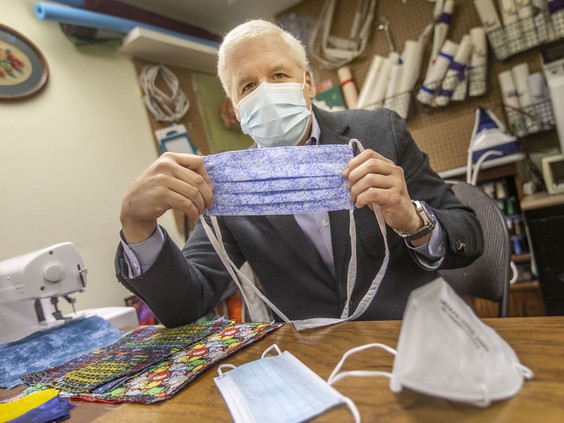
Home


A local researcher at the University of Windsor has offered alternatives to those unable to obtain an N95 mask as protection from COVID-19 and its variants.
Following a recent study, it was determined a two-ply cotton mask fastened tightly with ties over a basic medical mask offers similar protection as an N95 mask, according to Ken Drouillard, an environmental professor at the Great Lakes Institute for Environmental Research who participated in the effort.
“This is timely information for the public,” he said. “Given the high community risk factors posed by the Omicron variant and the scarcity of N95 masks, we want to be able to help people use the best mask they have access to.”
The study that Drouillard participated in was led by a team at McMaster University. It involved testing various masks, combinations of masks and mask-wearing devices to help determine the best performance of filtering out aerosol-sized particles.

With the double masking, it is the medical mask underneath doing most of the aerosol filtering, Drouillard said. The cotton mask with ties mainly acts to improve the fit of the medical mask underneath and prevent air leakage. The study also showed the two-ply cotton masks can be washed dozens of times without affecting performance.
When it comes to any mask the best prevention is based on a tight fit, which medical masks don’t always provide alone.
“Even with (double masks) you have to make sure it fits tightly to match N95 performance,” Drouillard said. “A lot of the medical masks are loose or don’t fit that well. One way to achieve that is the cloth mask that ties behind your head.
“Fogged-up eyeglasses when wearing your mask are evidence of air leakage around the nose.”
And not all medical masks offer the same protection, he said. True medical-grade masks are certified by ASTM, an international standards organization. A certified ASTM mask will include the organization’s name on the box.
There are three grades of masks available, the L1 being the cheapest and most accessible.
The study team’s testing has shown an L1 alone, worn snugly on the face, filtered out about 54 per cent of particles. A two-ply, pleated mask made of high-quality quilting cotton and with ties rather than ear loops provided 55 per cent effectiveness. In combination, with the cloth mask with ties worn over the L1, the filtration rate was nearly 91 per cent.
The research team studied participants and assembled results over about three months last fall. The work still remains ongoing.
Drouillard’s spouse, Rebecca Rudman, is one of the founders of the Windsor-Essex Sewing Force — a group of volunteers who have produced thousands of donated cloth masks and among those also participating in the study.
“Right now we are flushing out additional participants and will look at the results,” Drouillard said. “We do stress people use the best mask available to them since not everyone has access to N95 masks.”
